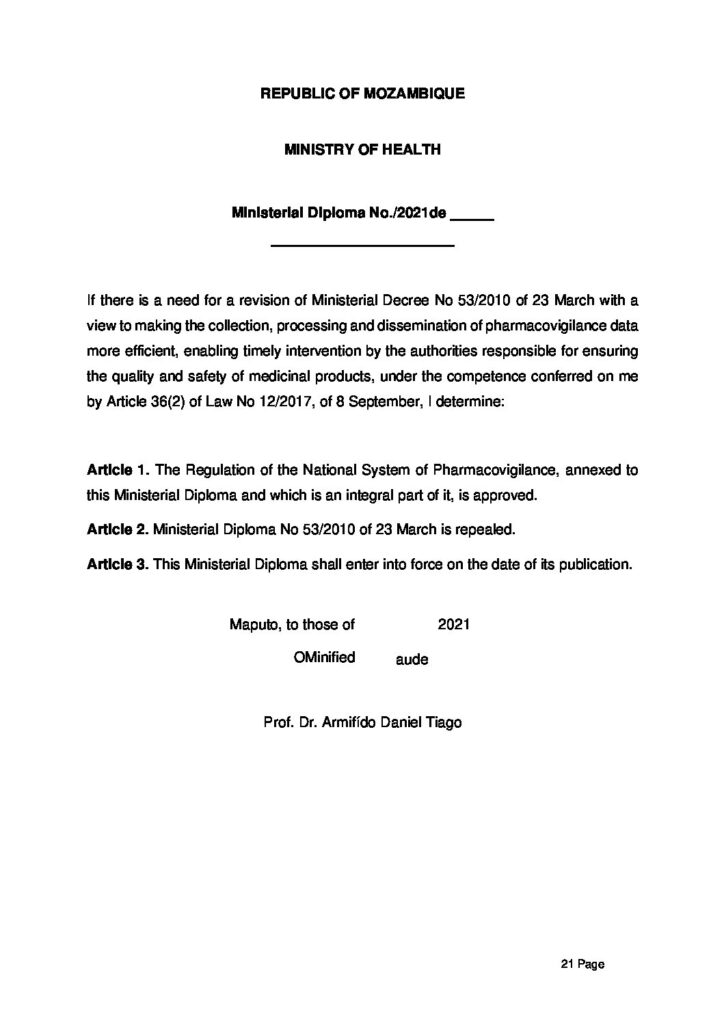Fill out the form below to receive the complete PDF guide directly in your inbox. This resource provides clear, step-by-step guidance to help you make the most of the information we’ve prepared for you.
Mozambique 🇲🇿
Regulation of the National Pharmacovigilance System – Ministerial Diploma No./2021
This Ministerial Diploma updates and replaces Mozambique’s earlier Decree No. 53/2010, strengthening the regulation of the National Pharmacovigilance System. It defines the functioning, objectives, and scope of pharmacovigilance, covering medicines, vaccines, biologicals, and health products for human use. The regulation establishes the responsibilities of the National Medicines Regulatory Authority (ANARME), the National Pharmacovigilance Centre, the National Commission on Pharmacovigilance, health institutions, healthcare professionals, and Marketing Authorisation Holders (MAHs). Key provisions include adverse reaction reporting, risk management plans, periodic safety reports, pharmacovigilance inspections, and the promotion of public health integration.

Use Cases
-
Marketing Authorisation Holders (MAHs) – Ensure Regulatory Compliance: They must follow the detailed procedures for collecting, managing, and immediately reporting suspected adverse reactions to the National Center for Pharmacovigilance.
-
National Medicines Regulatory Authority (ANARME, I.P.) – System Management and Oversight: The authority uses it to implement, manage, and maintain the national system, coordinate safety measures, and manage the official pharmacovigilance database.
-
Health Professionals (Doctors, Pharmacists) – Mandatory Safety Reporting: All health professionals are covered by this regulation, making it their duty to monitor and report all problems related to medicines, vaccines, and health products.
-
Public Health Program Managers – Integrate PV into Programs: They use the guidelines to incorporate pharmacovigilance activities into their specific health initiatives, such as those for vaccines or chronic disease treatments.
-
Pharmaceutical Researchers/Research Centers – Conduct Safety Studies: It serves as a mandate and guide for the promotion and conduct of pharmacovigilance studies, ensuring due coordination with competent entities.
-
Patients and Consumers – Informed Reporting and Safety Awareness: The system provides mechanisms for patients to notify cases of intoxication, abuse, misuse, or other problems, thereby contributing directly to public safety monitoring.
Key takeaways you'll learn
The resource’s purpose is to establish a robust, nationwide system for detecting, assessing, understanding, and preventing adverse effects and other problems related to medicinal products for human use. It aims to ensure that medicines remain safe and effective throughout their entire lifecycle in Mozambique.
- Expanded Scope of Reporting: Pharmacovigilance extends beyond Adverse Drug Reactions (ADRs) to include reporting on administration errors, loss of efficacy, quality deviations, and product abuse/misuse.
- Centralized Coordination: The National Center for Pharmacovigilance (CNF), under the direction of ANARME, I.P., is the core body responsible for coordinating the planning, evaluation, and development of all system actions.
- Mandatory Risk Management: Marketing Authorization Holders (MAHs) must collect data and prepare official safety documentation, such as Risk Management Plans (PGR) and Periodic Safety Reports (RPS).
- Systemic Integration: The Regulation mandates the integration of pharmacovigilance activities across the entire health sector, encompassing public and private institutions, health units, and education centers.
- Focus on Communication: A key objective is the dissemination and communication of information about product risks to ensure timely intervention and public awareness.


